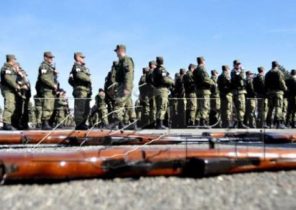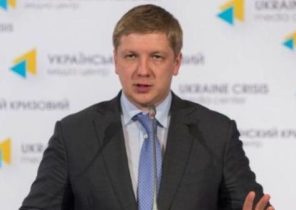
Lisa — a teenage girl born in Russia. In January last year, she said that she was abducted and raped by three men. She suggested that they were immigrants, noting that the kidnappers were “southerners”, do not speak German.
As spread this story on social networks pounced on it the Russian media, extensively talks about that 13-year-old girl was kept as “sex slaves”.
Even before the German police have completed the investigation, the Minister of foreign Affairs of Russia Sergey Lavrov has accused Berlin of trying to “sweep the problem under the carpet”. In response, Germany has warned Russia against using this case for the purpose of “political propaganda”.
A few days later the Prosecutor’s office came to the conclusion that the girl was not kidnapped or raped. It turned out that she went to visit a friend and didn’t want to be parents because of trouble in school. Despite the findings of the Prosecutor’s office, Russian media continued to disseminate dire warnings about the sexual crimes committed by immigrants, which caused outrage in the Russian-speaking community in Germany. Across the country began protests, in particular, 700 people staged a demonstration in front of the office of Angela Merkel.
For the Germans pending the Russian intervention in the elections that will be held this year, “Lisa” is an example of possible developments. The case was blown out of proportion during election campaigns in the three regions on a background of mixed emotions because of the rushing flow of refugees to Germany, when the support was used by far-right party “Alternative for Germany” (AfD).
Berlin fears that Moscow is preparing a new intervention in the coming September elections in the Bundestag to overthrow Merkel. The Chancellor herself warned that Russia disseminated “misinformation on the Internet” can influence the outcome of elections.
Hans-Georg Maassen, head of the office for the protection of the Constitution (BfV), said about this more directly. He said that the Kremlin “is trying to influence public opinion and decision-making process” because “this year we have parliamentary elections.”
Berlin fears intensified on the background of statements by U.S. intelligence that Moscow interfered in the American presidential election, cracking the computers of the Democratic party and published stolen information to harm Hillary Clinton and support of Donald trump.
The battle for liberal values
Betting on the September elections in Germany is very high. Merkel is running for a fourth term, despite criticism of its policy towards refugees. Once invulnerable, the Chancellor is struggling with disappointing his conservative supporters, and with the rise of the AfD, the first far-right party in post-war Germany, received a real opportunity to enter the Parliament.
Her supporters, led by former U.S. President Barack Obama, believe Merkel’s liberal beacon on the background of the rise nationalism intensified after the victory of trump, vote for a British exit from the EU and the growing support of extreme right-wing French leader marine Le Pen.
The defeat of Merkel in the election, or even a significant reduction of its influence in Parliament would be a tremendous victory for Russian President Vladimir Putin. He seeks to destroy the unity of the Western countries on the issue of sanctions imposed against Russia for its aggression against Ukraine and annexation of Crimea. This unity was largely created and continues to exist thanks to Merkel. In the long term he is interested in how to divide the EU, to split NATO and to drop the Alliance, penetrated far enough into territory once controlled by Moscow. “From the weakening of the unity of the West is most of all Putin wins,” said Norbert röttgen (Norbert Röttgen), head of the Bundestag Committee on foreign Affairs.
Moreover, Moscow believes Merkel is the main representative of the liberal world order, which is how long Putin feared, could undermine his authoritarian regime in Russia. If you can belittle it, and defend the values it will fade.
EU officials say that the Kremlin still don’t know what to expect from the unpredictable Donald trump, whose recent decision to ban entry into the United States to immigrants and refugees from seven Muslim countries has caused a storm around the world. But his criticism of the EU, NATO and free trade agreements allow Moscow to present the German Chancellor in isolation, especially when you consider that yesterday, she sharply criticized the US decision on refugees.
Sergei Karaganov, close to Kremlin foreign policy expert, wrote this month that the world sees the liberal end of the policy style of the EU: the “Old world order destroyed. We should build a new one”.
After the Second world war, the Russian-German relations without violence, but political interference was frequent. During the cold war in the divided Germany was conducted the most active espionage activities. After that, Germany followed the United States in the question of the spread of liberal democracy in the former Soviet republics with the ultimate goal of the inclusion of Russia into a liberal world order.
Under the new strategy, Putin, the Kremlin strikes back. Representatives of the security services in Germany are concerned that after the success of Moscow in undermining American elections, the vote in Germany would be a tempting target.
Effect modification
Russia has considerable influence in Germany, based on close economic, political and personal relationships. Russia is the main energy supplier of Germany, the state gas company “Gazprom” participates in the development of major projects in the country and sponsors the football club “Shalke”.
German leaders, especially the center-left social Democrats, Junior partners in Merkel’s coalition, for decades called for reconciliation with Moscow. Official data show that after the fall of the Berlin wall about three million Russian-speaking immigrants came to Germany, including about two million so-called Russian Germans, descendants of German immigrants who had gone to Russia hundreds of years ago.
Berlin and Moscow formalized these relationships with the help of many organizations, headed by the German-Russian forum, largely funded by businessmen of Germany, and “St. Petersburg dialogue”, financed mostly by the Ministry of foreign Affairs of Germany.
While post-Soviet Russia was weak, these institutions were considered a means of transmitting Western values to the East. But now critics say they have become channels of Russian influence in Germany.
“Under Putin, these networks have found a new, more sinister purpose — to change the rules of the bilateral relations, to influence German policy towards Eastern Europe and Russia and to influence EU decisions through the structure of influence in Berlin,” wrote Stefan Meister (Stefan Meister), a Russian expert at the German Council on foreign Affairs report published by the “Atlantic Council” last year.
The German political world is more and more critical against Putin for his authoritarian style of government in Russia, the crisis in Ukraine and the bloody Russian intervention in the Syrian war. In the end, the German elite were distrustful of Moscow. But the Internet has given Russia and other foreign powers new opportunities to bring their ideas to the public.
The Kremlin uses television and radio broadcasting, Internet news sites, social networks and chat rooms to reach out to foreign audiences — including German. Open German edition of Russia Today, the main TV channel broadcasting abroad. To communicate with Russian-speaking audience even more the importance of Russian TV channels are available worldwide via the Internet.
The Maester says this work can be considered propaganda, since the materials chosen specifically to confuse and mislead the audience. Case Lisa is a good example, he said, but there are others, in particular, the Russian message about the flight MH-17 shot down in Ukraine in 2014. If Western officials have said that the plane was hit by a Russian missile fired by Pro-Russian separatists, Russian media blamed Ukrainian forces, giving strong evidence.
Alexander Rahr, scientific Director of the German-Russian Forum, who is considered sympathetic to Russia, said that to call all Russian state-supported media propaganda “primitive”. He said: “Propaganda is, but there are serious documentaries. And how is this different from German TV which is a propaganda in many countries?”
Immigrants from the former Soviet republics do not constitute a monolithic social group, and many of them are well integrated into German society. Older people generally loyal to the bloc of the Christian democratic Union-Christian social Union of Angela Merkel — often out of gratitude to the former Chancellor, the conservative Helmut Kohl for his contribution to ending the cold war. But younger people often admire Putin, believing that he has restored respect for Russia.
The Pro-Russian media is also the German audience — mostly in the former Communist East Germany, where many are nostalgic for the Communist regime. “In the East the attitude to Russia is more positive, said the German official. Is one of the last symbols of a divided Germany.”
The left party formed on the basis of the former Communist party of Eastern Germany is friendly to Russia and oppose NATO. It is supported by 5% of the population of West Germany and 15% of the population of East Germany. AfD also relies on the support of East Germany.
German officials are particularly concerned about computer hacking of government systems for political purposes, for example, as was the hacking of servers of the Bundestag in 2015, when it was removed a large amount of information. Intelligence Agency BfV blamed the hacking on the hacker team of ART 28, which, presumably, is controlled by Russian special services.
BfV had misgivings because of American precedent, when the information of the computers of the Democratic national Committee caused damage to Hillary Clinton. “The fear of possible consequences of a cyber attack is spread among all the members of the Bundestag,” said Joachim Poss (Joachim Poss), MP from the Social democratic party.
The Kremlin has consistently denied involvement in the hacking of political organizations in the United States and of the state and rejects charges of meddling in elections in other countries. German intelligence services say that can not present irrefutable evidence of the Kremlin’s involvement in the hacking of the Bundestag. But they believe it is “very likely”.
Berlin strengthens protections against potential threats in cyberspace, including information theft and possible sabotage of the work of governmental institutions and power plants. The Ministry of defence has strengthened its capabilities in the field of electronic war, creating a division of cybersecurity population of 13,500 people. It should start in mid-2017.
The question whether Russian intervention is able to influence the outcome of elections, has been widely discussed. Some experts believe that Lisa will help AfD to the voices — especially Russian-speaking voters. Sergey Lagodinsky, a researcher from the Berlin Institute of the Heinrich bell, said: “It has had its effect, and people have not changed their thinking. Many people from Eastern Europe making multicultural society”.
Others say that the importance of this case is exaggerated. Gernot Erler (Gernot Erler), the special envoy of the government of Russia, said that as a result of such blatant interference hit on the Kremlin itself: “the Participants were in an awkward position. People realized that it was a manipulation.”
The Threat Of AfD
It would not necessarily keep Moscow from re-attempts. The key to undermining the position of Merkel is to strengthen support for AfD. The Chancellor, of course, there are other opponents, among them the Social democratic party, the green Party and the Left party. But they supported its policies towards refugees and AfD led the charge on this policy. She is also skeptical about the EU and friendly to Russia, pleading for a lifting of sanctions imposed over Ukraine. “Russian intervention in the German policy begins with the support of AfD,” said the Maester.
If the elections to the Bundestag in 2013, the AfD had the support of 4.7 percent of voters, now the number of supporters reaches 12% -15% in the polls. Support is still far from 32%-35% of the supporters of the CDU-CSU, but it is approaching 21% support of the social Democrats, the second place.
The chances of the AfD entirely dependent on the media publications on issues of immigration and Islamic terrorism. For the Russian media is the fertile ground, as they constantly illuminate the attack, including a terrorist attack on a Christmas market in Berlin, and demonstrations of opponents of immigration — for example, marches based in Dresden, the PEGIDA movement.
“The online media, directed by Russian spreading disinformation and false interpretiruya event, said Christian Lindner (Christian Lindner), the leader of the liberal party “Free Democrats”. — Thus, our country will be destabilized, and AfD will become stronger.”
Germany’s Merkel to destabilize difficult. Its economy is strong, unemployment is low, crime rate is not too high, so the chances of the Chancellor to lose the parliamentary elections are considered insignificant. But trump was a chance to occupy the White house. No one knows if the Kremlin changed the balance and that he can try to do in Germany. But the case of Lisa will not be the last attempt.







